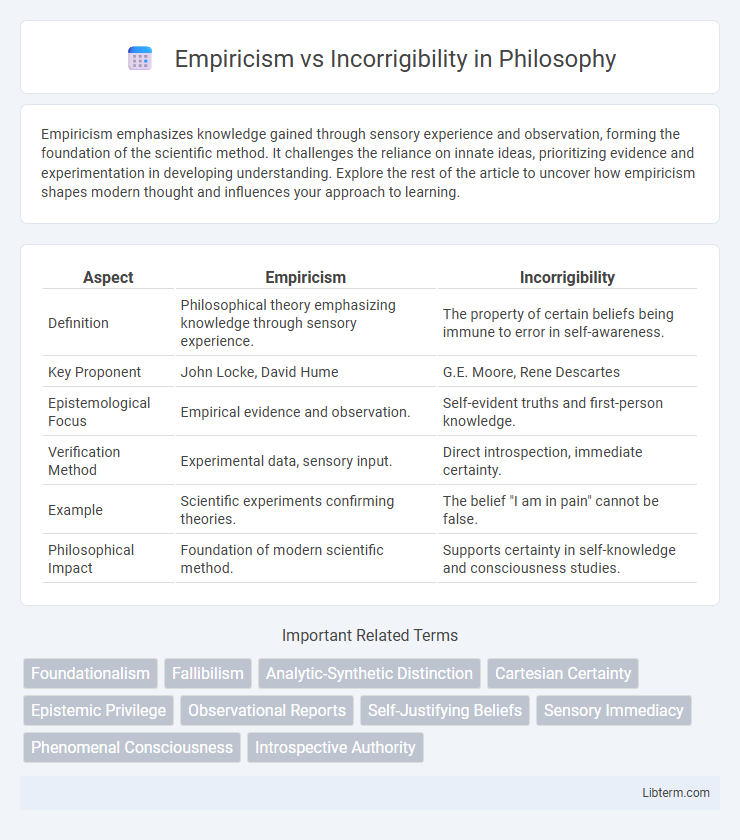Empiricism emphasizes knowledge gained through sensory experience and observation, forming the foundation of the scientific method. It challenges the reliance on innate ideas, prioritizing evidence and experimentation in developing understanding. Explore the rest of the article to uncover how empiricism shapes modern thought and influences your approach to learning.
Table of Comparison
| Aspect | Empiricism | Incorrigibility |
|---|---|---|
| Definition | Philosophical theory emphasizing knowledge through sensory experience. | The property of certain beliefs being immune to error in self-awareness. |
| Key Proponent | John Locke, David Hume | G.E. Moore, Rene Descartes |
| Epistemological Focus | Empirical evidence and observation. | Self-evident truths and first-person knowledge. |
| Verification Method | Experimental data, sensory input. | Direct introspection, immediate certainty. |
| Example | Scientific experiments confirming theories. | The belief "I am in pain" cannot be false. |
| Philosophical Impact | Foundation of modern scientific method. | Supports certainty in self-knowledge and consciousness studies. |
Introduction to Empiricism and Incorrigibility
Empiricism emphasizes knowledge derived from sensory experience and evidence, positioning observation as the foundation of human understanding. Incorrigibility refers to the philosophical concept that certain beliefs or propositions are immune to error when asserted by the subject, often linked to immediate self-knowledge or introspection. The contrast lies in empiricism's reliance on external perception versus incorrigibility's focus on infallible internal states.
Defining Empiricism: Foundations and Key Principles
Empiricism is a philosophical doctrine emphasizing knowledge derived from sensory experience, positioning observation and experimentation as the primary sources of valid information. Its foundations rest on the idea that human understanding originates from empirical evidence rather than innate ideas or pure reason. Key principles include the reliance on inductive reasoning, verification through observable phenomena, and the rejection of metaphysical assumptions lacking empirical support.
Understanding Incorrigibility: Meaning and Context
Incorrigibility refers to a statement or belief that cannot be proven wrong because it is inherently self-verifying, often arising in discussions of knowledge and consciousness. In epistemology, incorrigibility is significant because it contrasts with empiricism, which relies on sensory experience and external verification. Understanding incorrigibility involves recognizing its role in identifying beliefs that are immune to doubt, typically first-person present-tense assertions about one's own mental states.
Historical Background: Empiricism vs Incorrigibility
Empiricism, rooted in the works of John Locke and David Hume during the 17th and 18th centuries, emphasizes knowledge derived from sensory experience and observation as the foundation of understanding. Incorrigibility, closely associated with Rene Descartes and later linguistic philosophers like Wittgenstein, argues certain self-evident truths or propositions, especially those concerning immediate self-knowledge, cannot be proven wrong through external evidence. The historical tension between empiricism's reliance on empirical data and incorrigibility's claim of inherent certainty has shaped modern epistemology and debates on the nature of knowledge and certainty.
Philosophical Arguments for Empiricism
Empiricism, grounded in the philosophy of knowledge, asserts that experience and sensory perception are the primary sources of understanding reality, contrasting with the concept of incorrigibility which claims certain beliefs are beyond error or doubt. Philosophical arguments for empiricism emphasize the fallibility of human cognition and the necessity of empirical evidence for validating knowledge, challenging the notion that any belief can be infallibly true. Empiricists like John Locke and David Hume argue that knowledge originates from experience, rendering claims of incorrigible beliefs unfounded without sensory corroboration.
Key Examples of Incorrigibility in Philosophy
Incorrigibility refers to statements or beliefs that cannot be proven wrong by the subject asserting them, such as Descartes' famous declaration "Cogito, ergo sum," which exemplifies self-evident truth in philosophy. Another key example is the immediate awareness of one's own mental states, where the knowledge of feeling pain or experiencing thoughts is considered incorrigible and immune to error. These instances contrast with empiricism, which relies on sensory experience and is always open to revision based on new evidence.
Major Criticisms of Empiricism and Incorrigibility
Empiricism faces major criticisms for its reliance on sensory experience, which can be deceptive, insufficient for acquiring all knowledge, and fails to account for a priori concepts and innate ideas. Incorrigibility, often associated with beliefs or mental states that cannot be proven false by the subject, is criticized for its subjective nature and the difficulty in distinguishing genuinely incorrigible states from those simply resistant to error correction. Both approaches encounter challenges: empiricism's potential to limit knowledge to sensory data and incorrigibility's potential to create unverifiable, internally consistent but externally questionable beliefs.
Comparing Empirical Knowledge and Incorrigible Beliefs
Empirical knowledge relies on sensory experience and observation, making it subject to revision and error due to the fallibility of perception and external conditions. Incorrigible beliefs, by contrast, are those that cannot be proven wrong by any experience or evidence, such as self-evident truths or immediate mental states. The key distinction lies in empirical knowledge's dependence on external validation, whereas incorrigible beliefs maintain a form of epistemic certainty independent of empirical testing.
Modern Perspectives: Contemporary Debates
Modern perspectives on empiricism emphasize sensory experience as the foundation of knowledge, while debates on incorrigibility challenge the notion that certain beliefs are immune to error. Contemporary philosophers argue that empirical evidence must be critically examined, as incorrigibility claims often fail to account for cognitive biases and revision under new information. This ongoing discourse shapes epistemology by balancing empirical validation with skepticism about absolute certainty.
Conclusion: Reconciling Empiricism and Incorrigibility
Reconciling empiricism and incorrigibility involves acknowledging the strengths of sensory experience while recognizing the certainty of self-evident truths. Empiricism emphasizes knowledge derived from observation and experimentation, whereas incorrigibility highlights statements or beliefs that are immune to error or doubt. Integrating these approaches allows for a more robust epistemological framework that balances empirical validation with inherent cognitive certainty.
Empiricism Infographic

 libterm.com
libterm.com